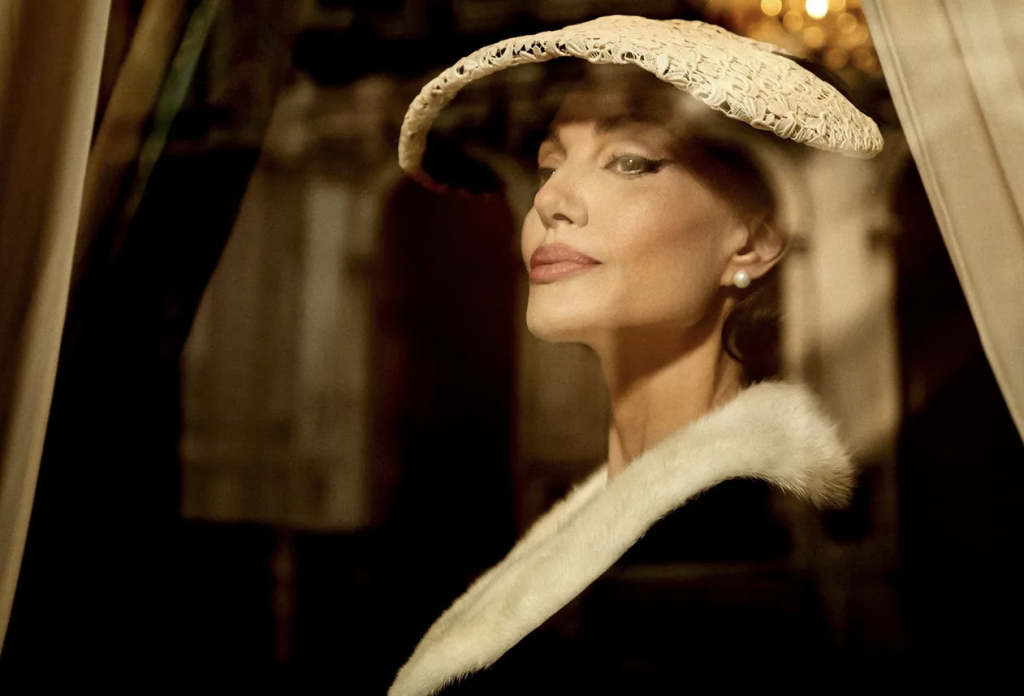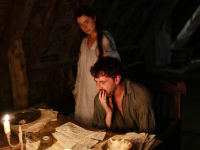Suffering from failing health, opera singer Maria Callas recounts her heady past to a young filmmaker.
Directed and produced by Pablo Larraín, who has given us some marvellous yet vulnerable recent insights into what is now some of the most important and prolific female figures of the 20th Century, such as Jackie 2016 (Kennedy) and (Lady Diana) Spencer in 2021 comes another reveal of a star who lived for – in this case – the adoration of her public on the operatic stage. With Angelina Jolie nominated for ‘Best Actress in a Motion Picture’ and nominated for Best Cinematography at the 97th Academy Awards, we are in the capable hands of writer and creator Steven Knight of Peaky Blinders fame, ‘Maria’ concentrates on what – unknown to Callas at the time – will be the final week of her life as she continued to be a recluse in her lavish Paris apartment in the late 1970’s paid for by shipping magnate Aristotle Onasis, before dying of a sudden heart attack at the age of 53 in September 1977.
Starring most definitely front and centre Angelina Jolie is our soprano gracing the silver screen in what could be in places an advert for the most beautiful architectural buildings in Paris. A metaphor for the enchantress of Maria Callas and her highly trained sought after voice in the mid 20th century. A film of beauty, style and reverence of a woman who lived fast in the glaring international spotlights on and off the stage in the most famous opera houses and indeed yachts around the world. With a supporting cast of a few so as not to take away from the subject we have Pierfrancesco Favino as her loyal butler Ferrucio, and Alba Rorhwacher as her maid Bruna. But of course her life was so much bigger which is where are introduced to Haluk Bilginer as her secret lover Onasis and Caspar Phillipson as John F.Kennedy – whom she never actually met – to help illustrate the level she achieved as a media professional in her heady and comparatively short life.
This biopic film looks at her life through rose coloured flashbacks with the assistance of what would be her mental crotch of her addiction to the drug Mandrax. Visiting via brief yet gorgeous visions, sometimes in a black and white, with a historical look that for the most part does not use the needless graining which so often takes away from the image for the sake of old style realism, this is most definitely not one of those films and is all the better for it. Romantically viewing the past through mostly romantic visions we are privy to her love and longing of Onasis – who then went on to marry Jackie Kennedy.
Jolie’s training for this biopic took seven months to get her voice closer to that of Callas, yet we are mostly witness to extremely well versed miming for the most part only for Angelina’s real, less trained voice to be used for her end of days vocals where Callas’ own began to falter. It is, however, the final well documented scene where Jolie’s voice was used for her ‘Swan Lake’ style heart wrenching ending where the incredible emotion began to interfere with her closer to operatic voice whilst filming.
Maria is in parts gorgeous to view and in parts stunning to listen to but the overall feel of the film leaves one wanting for more of her story, and less of the theatrics that veer this film into the reverential rather than the reality. Of course the majority of the time is through her sheer longing of being in the limelight once more and adored by those around whom she would prefer not to actually interact with but perform to. Jolie’s performance is more interpretation than impersonation and once again the timeline is far too short for the overall balance one may want from what could have been, if done well, a superb biopic.
Within the film a line is used where “I am hearing Maria. I want more Callas.” Here I feel that more of both would have given us the impact we may have been looking for.
Author: Piers, Maidstone Store







